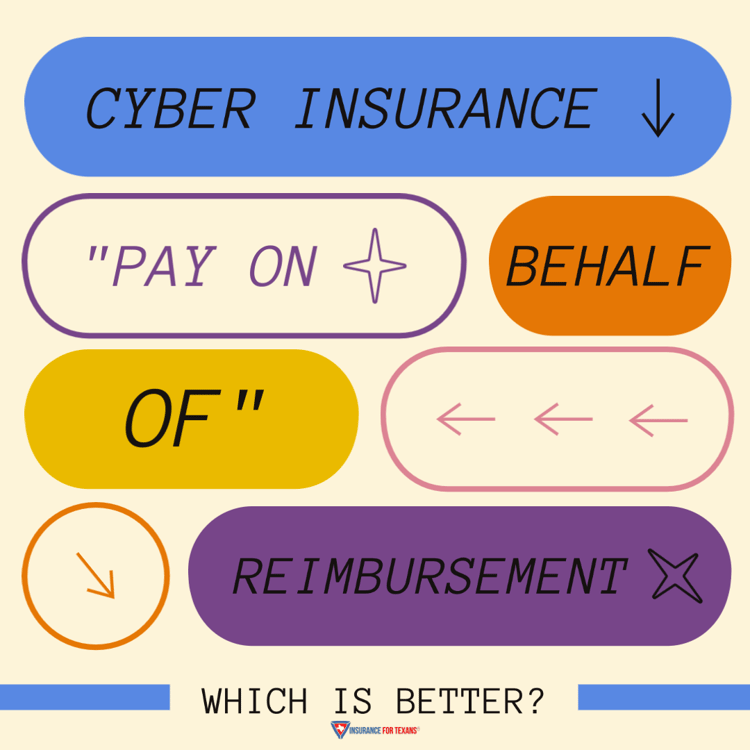Cyber liability insurance is a type of insurance that helps businesses protect against the financial consequences of data breaches, cyber-attacks, ransomware events, and other types of digital threats from cyber criminals. When reviewing cyber insurance policies for businesses, limits and coverages are compared. How an insurance company will respond as a part of the claim process is also important.
Whether the cyber insurance carrier will “pay on behalf of” or “reimburse” is a significant feature that should be understood by the policyholder. Depending on the language included with your policy your business may be responsible for all costs upfront or they may be paid in full as the claim progresses by your insurance carrier. So what is the difference between "pay on behalf of" and "reimbursement" language in cyber policies?

Pay On Behalf Of
Pay-on-behalf coverage allows businesses to use their cyber liability insurance policy to pay for certain expenses that are incurred as a result of a cyber incident, rather than having to pay out of pocket. This can include costs such as legal fees, public relations expenses, and notification and credit monitoring services for affected customers.
Having pay-on-behalf coverage can be especially beneficial for small businesses, which may not have the financial resources to pay for these expenses on their own. It can also be useful for larger businesses that want to avoid using their own funds to pay for these types of expenses, as it can help to preserve cash flow and protect against potential financial losses.
One important thing to note about pay-on-behalf coverage is that it typically has limits, which means that there is a maximum amount that the insurance policy will pay for these types of expenses. It is important for businesses to understand these limits and to ensure that they have sufficient coverage to meet their needs.
Overall, pay-on-behalf coverage can be a valuable resource for businesses that are looking to protect themselves against the financial consequences of cyber incidents. By having this type of coverage in place, businesses can have peace of mind knowing that they have a way to pay for the costs associated with responding to a cyber incident, without having to dip into their own funds.
Reimbursement
Reimbursement coverage, on the other hand, refers to a type of insurance that requires the policyholder to pay for cyber-related expenses out of pocket upfront, and then submit a claim to the insurance company to be reimbursed for those expenses later. In this case, the insurance company will review the claim and, if it is approved, will reimburse the policyholder for the covered expenses.
One key advantage of reimbursement coverage is that it may have lower premiums than other types of coverage, such as pay-on-behalf coverage. This can make it a more cost-effective option for businesses that are looking to protect themselves against the financial consequences of cyber incidents.
However, it is important for businesses to understand that reimbursement coverage typically requires them to pay for expenses out of pocket and then submit a claim to the insurance company for reimbursement. This can be inconvenient for businesses that may not have the financial resources to pay for these expenses on their own, or that want to avoid using their own funds to pay for them.
Some of the expenses that may be covered by reimbursement coverage in the event of a cyber incident include legal fees, public relations expenses, and the cost of notification and credit monitoring services for affected customers. It is important for businesses to understand the limits of their reimbursement coverage, as there may be a maximum amount that the insurance policy will pay for these types of expenses as well just as there is with "pay on behalf of" cyber coverage.

Which Is Better?
Ultimately, the choice between "pay on behalf of" and "reimbursement coverage" will depend on the individual needs and preferences of the policyholder. It is important for policyholders to carefully consider their options and choose the coverage that best fits their individual risk tolerance. There are many different cyber policy forms available in the marketplace and the forms continue to change as new cybersecurity risks evolve. Working with an independent insurance agent allows you to review and discuss all of the options available to find the right cyber insurer for your particular needs. If you would like to discuss a new cyber insurance policy or discuss your current cyber coverage please contact our office today.



